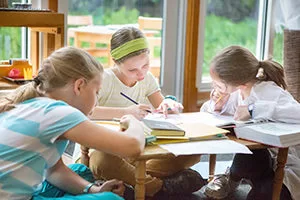Montessori Philosophy
The Power of Independence: How Montessori Education Fosters Self-Reliant Children
Imagine a classroom where children as young as three confidently prepare their snacks, clean up their workspaces, and choose their next activities—all without being told what to do. This is not a scene from a utopian novel but a daily reality in Montessori schools worldwide. A study by the University of Virginia found that children…
Read MoreReady For School!
When my 18-month-old daughter walks into that Montessori classroom, she seems to stretch up taller,” an astonished Forest Bluff parent once told me. For sure, many children do exhibit pride and self-confidence when they are supported to be appropriately independent, from both home and school. We talk a lot about how and why Montessori’s approach…
Read MoreMontessori Sensorial Materials, Part II December 16, 2022
Imagine you are watching a four-year-old boy carry a wooden box with a red lid to a table. Then, he goes back to the shelf of Sensorial Materials and brings over a matching box—this one with a blue lid. (These are called the Sound Cylinders. Each is filled with about one ounce of grains of…
Read MoreMontessori Sensorial Materials, Part I November 15, 2022
Why Are Montessori’s Sensorial Materials Important for Children? Great question! We all recognize those beautiful wooden prisms and the pink tower of cubes as being Montessori’s distinct materials for children’s development. The glossy red rods and the blocks with rows of tiny wooden knobs are intriguing. They seem to call out to be touched and…
Read MoreReturning to Our Montessori Values After Two Years of Screens
We are more grateful than ever for the technology in our lives! During the pandemic, being physically separated from one another was painful, especially for our children who crave social interaction. Out of necessity, we learned inventive ways that computers, iPhones and iPads could connect us–to one another and to information about the world.
Read MoreLet’s Play! Montessori’s Playful Nature
As a parent, you may hear Montessori teachers describe your children’s activities as “work.” Your child may use the word, too, saying, “I love my work,” or, “I did a lot of work today!” But then you may wonder, “Why does my child go skipping in there every day?” and, “Why is my child dying…
Read MoreAn Education that Matches Children’s Development
September 2018 by Paula Lillard Preschlack Developmentally, children pass through distinct phases as they age, which are universal across time and place. These phases, or planes, are the basis for Maria Montessori’s approach to education, which caters to the specific needs and characteristics of each plane.
Read MoreHave Faith in the Children
December 2021 By Paula Lillard Preschlack Maria Montessori often asked us to have faith in the children. What did she mean by this, and how and why can parents do this? It makes all the difference.
Read MoreMontessori and the Power of Mental Association
Associative thinking is a key to innovation and problem-solving. At every age, Montessori cultivates the ability to make mental associations.
Read MoreHow Montessori Fosters Curiosity and Courage
March 2021 by Paula Lillard Preschlack Montessori graduates share how the traits of curiosity and courage fostered at school now play an important role in their adult lives.
Read More









